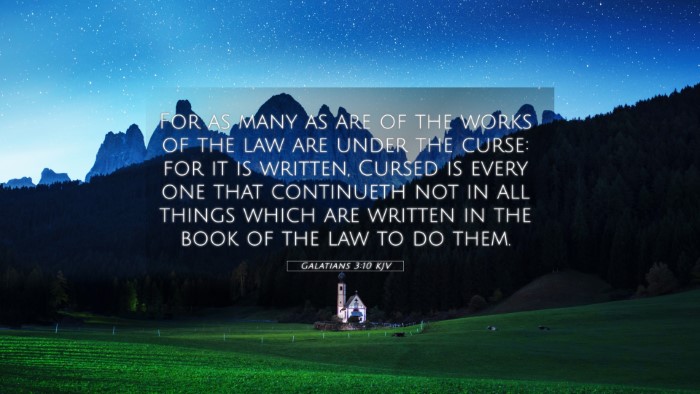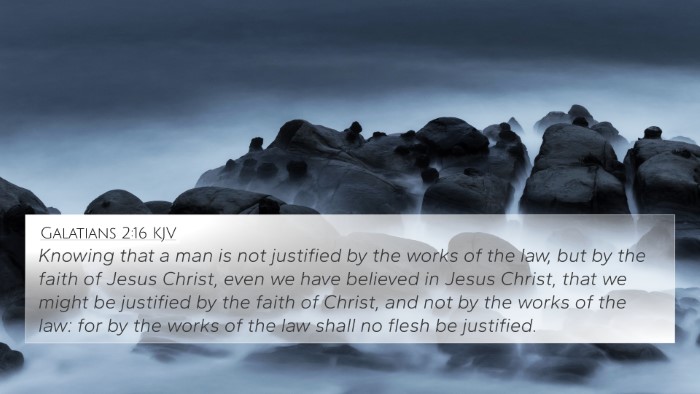The verse from Galatians 3:10 captures a profound truth about the relationship between the law and faith. Paul explains that anyone who relies on the works of the law to achieve righteousness is under a curse. This curse stems from the inability to perfectly fulfill the law, which is an impossible standard for humanity.
Matthew Henry's Commentary Insight
Matthew Henry emphasizes that Paul quotes from Deuteronomy 27:26, reinforcing the idea that the law condemns those who do not adhere to it entirely. He points out that this raises the impossibility for humans to be justified by the law alone, highlighting the necessity for grace through faith in Christ. Henry stresses the importance of recognizing the law's role in demonstrating our need for salvation.
Albert Barnes' Commentary Insight
Albert Barnes elaborates that this verse introduces a crucial theological point: linking adherence to the law with eternal consequences. He explains that the 'curse' mentioned signifies a separation from God, and it is a reminder of human fallibility. Barnes connects this notion to the overarching theme of Galatians, which is about liberation from the law through Christ’s redemptive work.
Adam Clarke's Commentary Insight
Adam Clarke provides a historical perspective on the Jewish interpretation of the law. He notes that many Jews believed strict observance of the law was the way to righteousness, leading to spiritual pride. However, Clarke concurs with Paul that such views lead to spiritual despair since no one can meet the law’s demands completely. Clarke emphasizes the availability of grace through faith in Jesus Christ as the true antidote to this curse.
Cross-References and Thematic Connections
This verse can be connected with various other scripture texts that elucidate its themes:
- Romans 6:23 - "For the wages of sin is death; but the gift of God is eternal life through Jesus Christ our Lord."
- James 2:10 - "For whosoever shall keep the whole law, and yet offend in one point, he is guilty of all."
- Deuteronomy 27:26 - "Cursed be he that confirmeth not all the words of this law to do them. And all the people shall say, Amen."
- Galatians 2:16 - "Knowing that a man is not justified by the works of the law, but by the faith of Jesus Christ... "
- Romans 3:20 - "Therefore by the deeds of the law there shall no flesh be justified in his sight: for by the law is the knowledge of sin."
- Philippians 3:9 - "And be found in him, not having mine own righteousness, which is of the law, but that which is through the faith of Christ."
- Galatians 5:4 - "Christ is become of no effect unto you, whosoever of you are justified by the law; ye are fallen from grace."
Analysis of Theological Significance
Paul's message in Galatians 3:10 challenges readers to examine their understanding of righteousness. The law, while perfect and just, reveals human inadequacy. The transition from law to grace is pivotal in Christian faith, and this verse encapsulates that shift.
Connections Between Bible Verses
The thematic connections establish a dialogue across different books of the Bible. The idea of judgment according to the law (as seen in Romans 2:12) and the grace offered through faith in Jesus (as elaborated in the writings of Paul) provides a comprehensive framework for understanding salvation.
The study of Galatians 3:10 should not only focus on individual meanings but also analyze how various verses interconnect and reinforce each other, forming a solid base for comprehending the entirety of Biblical theology.
Practical Application
For modern believers, the implications of this verse are profound. Understanding that reliance on personal effort under the law leads to spiritual death inspires a shift towards faith and grace, highlighting the need for Christ as the ultimate solution to the curse of the law.
Conclusion
In summary, Galatians 3:10 serves as a powerful reminder of the limitations of human righteousness and the necessity of divine grace. Through cross-referencing various scriptures, we recognize the cohesive message of the Bible concerning salvation, righteousness, and God’s unending grace.

















